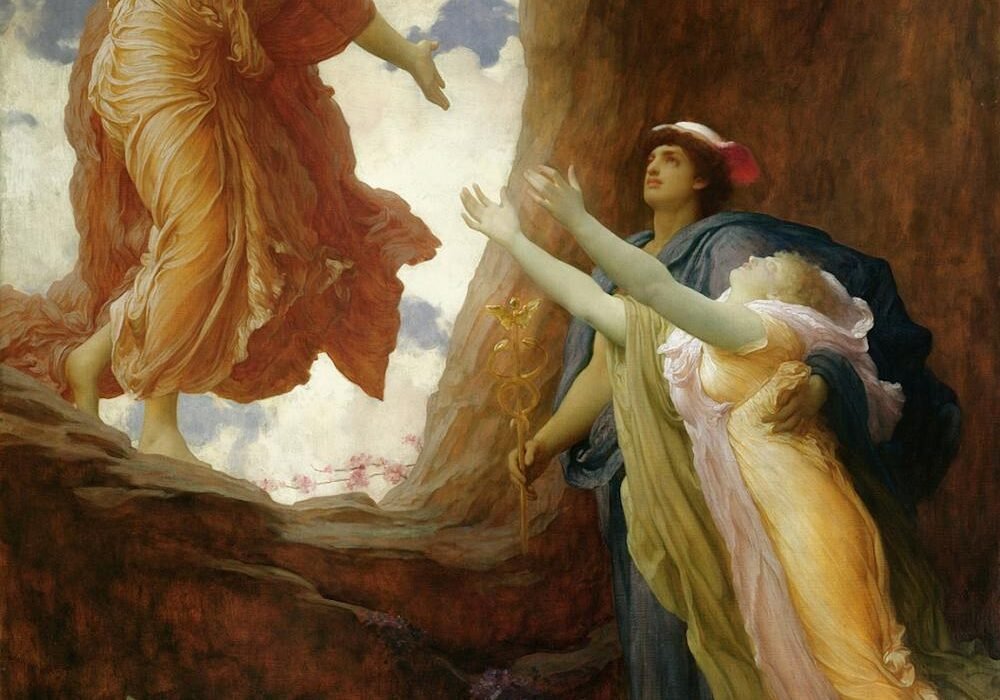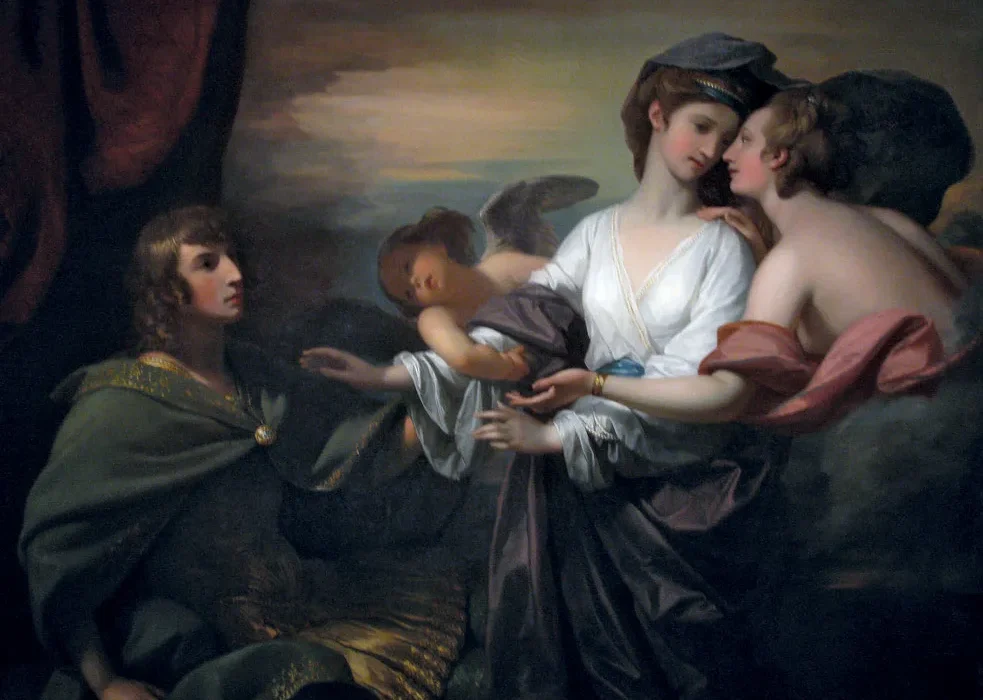In the quiet whispers of ancient forests, where myth and reality once intertwined, there is a story of longing, punishment, and unfulfilled love. It is a story that belongs to two figures of Greek mythology—Echo, the nymph with a voice that was both her gift and her curse, and Narcissus, the beautiful youth who fell in love with his own reflection. Their tale is not just a simple myth; it is an allegory about desire, obsession, and the destructive power of vanity. To this day, the names “Echo” and “Narcissus” reverberate in our language, psychology, and art.
This story, handed down from the poets of ancient Greece and immortalized by the Roman poet Ovid in his Metamorphoses, continues to move us. It is emotionally haunting, scientifically intriguing, and profoundly human. For within it lies an exploration of love unreturned, the consequences of hubris, and the tragic ways in which our voices and reflections can betray us.
Echo: The Voice of the Mountains
Before her curse, Echo was no ordinary nymph. She was an Oread, a mountain nymph, known for her playful nature and her extraordinary gift of speech. Unlike many other nymphs, Echo loved words. She delighted in telling long stories, captivating gods, goddesses, and mortals alike with her eloquence. Her laughter carried through valleys, her voice ringing as bright as the mountain springs she guarded.
But her gift became her downfall. Zeus, the king of the gods, often pursued mortal women and nymphs, and Echo, loyal in her own way, would distract Hera, Zeus’s wife, with her chatter. Hera, suspicious and jealous, eventually discovered the trick. Furious that Echo had aided Zeus’s deceptions, she struck the nymph with a cruel punishment.
Hera declared that Echo would lose her own voice, condemned forever to repeat only the last words spoken to her. No longer could she express her own thoughts, weave stories, or charm others with conversation. She was robbed of individuality, forced to live as a reflection of others’ voices.
Imagine the despair—being alive, full of feeling and thought, yet never able to truly express them. Echo’s curse turned her into a prisoner of sound, a ghostly presence in conversation, forever doomed to speak second.
Narcissus: Beauty That Became a Curse
While Echo’s tragedy was one of silence, Narcissus’s was one of sight. He was born to the river-god Cephissus and the nymph Liriope, a child so breathtakingly beautiful that even as an infant, seers predicted his beauty would shape his fate.
The most famous prophecy came from the blind seer Tiresias. When asked whether Narcissus would live a long life, Tiresias gave a cryptic reply: “If he never knows himself.” This strange prophecy would prove to be the foundation of his doom.
Narcissus grew into a young man admired by all who saw him. His beauty was radiant, almost divine. Men and women alike longed for his affection, yet he dismissed them all. Prideful and self-absorbed, Narcissus rejected love at every turn. His heart was untouched, a fortress that no one could breach.
Among those who fell under his spell was the cursed nymph Echo.
The Meeting of Echo and Narcissus
One day, while Narcissus was wandering the forests, Echo spotted him. She was captivated at once by his beauty, a love at first sight that burned like fire within her. But how could she speak to him? Hera’s curse bound her tongue. She could not call his name or confess her longing.
She followed him silently, hiding among the trees, aching with desire yet paralyzed by her condition. Narcissus, sensing someone nearby, called out, “Who’s there?”
Her heart leapt. At last, she could speak—but only in fragments. From the shadows came her voice: “There.”
Confused, Narcissus looked around. “Come!” he shouted.
“Come!” Echo repeated, her voice trembling with both hope and fear.
At last, when he asked, “Let us meet,” Echo burst from her hiding place, rushing to embrace him, arms outstretched in desperate love.
But Narcissus recoiled. He rejected her harshly, sneering at her neediness. “Away from me! I would rather die than let you have me.”
Echo’s heart shattered. She could only echo back his cruel words: “Have me… have me…” Her humiliation cut deeper than any wound.
The Curse of Rejection
From that day, Echo wasted away with grief. She retreated into the wilderness, her body fading, her form disappearing, until nothing was left of her but her voice. That voice, cursed to repeat others, lingered among mountains and valleys. Travelers who shouted into the canyons would hear Echo reply, her ghostly presence immortalized in sound.
Narcissus, however, was not free of consequences. The gods and spirits of nature grew angered by his arrogance. How could one so beautiful scorn all affection, leaving only heartbreak behind? One of his rejected lovers prayed for vengeance, and the goddess Nemesis, spirit of retribution, heard the plea.
She lured Narcissus to a clear, still pool of water in the forest. When he knelt to drink, he saw his reflection for the first time. In that instant, he fell deeply, hopelessly in love—with himself.
Unable to look away, Narcissus remained transfixed, staring at the perfection of his image. He tried to embrace the reflection, but the water only rippled and blurred. He reached for the beauty he saw, but it was always just out of reach. The longer he gazed, the deeper his obsession grew.
Consumed by self-love, Narcissus wasted away, just as Echo had. In some versions, he drowned trying to embrace the reflection. In others, he simply withered beside the pool, entranced until death claimed him. Where his body fell, a flower bloomed—the narcissus flower, delicate and beautiful, its head bent as though forever gazing downward at its own image.
Symbolism of Echo and Narcissus
The myth of Echo and Narcissus is more than a tragic love story. It is a parable filled with symbolism that has resonated for centuries.
Echo’s fate represents the pain of unrequited love and the silencing of identity. She becomes a metaphor for those whose voices are diminished, whose individuality is erased, leaving them trapped in repetition. In a world where communication is vital, her inability to express her own thoughts is a powerful image of despair.
Narcissus, meanwhile, embodies vanity, pride, and self-obsession. His rejection of others and his fatal attraction to his own reflection serve as warnings about the dangers of selfishness. To be consumed by oneself is to be cut off from love, connection, and ultimately, from life itself.
Together, their stories reflect the dual dangers of silence and selfishness—the pain of not being heard and the destruction of refusing to see beyond oneself.
The Psychology of Narcissism and Echoism
These myths live on not only in literature but also in modern psychology. The term “narcissism” is directly derived from Narcissus. In psychology, narcissism describes a personality characterized by excessive self-focus, a need for admiration, and a lack of empathy for others.
Meanwhile, the concept of “echoism” has emerged as a complementary idea. Echoism refers to individuals who struggle to express their own needs, who suppress their voices for fear of rejection, and who may be drawn to narcissistic personalities. It reflects Echo’s fate—being reduced to a mirror of others, rather than having an identity of one’s own.
Thus, the ancient myth has shaped scientific and cultural understanding of human relationships. Echo and Narcissus are not only figures of myth but archetypes of enduring psychological truths.
Echoes in Language and Culture
Even outside of psychology, their names echo through culture. The word “echo” describes the repeating sound that bounces back in mountains and canyons, immortalizing her curse in language. Narcissus gave us the term “narcissistic,” now commonly used to describe those absorbed by self-love.
Artists, poets, and writers have been captivated by their tragedy for centuries. Painters have depicted Narcissus gazing into pools of water, and poets have given voice to Echo’s silent longing. From Ovid to Shakespeare to modern adaptations, their story resonates as one of love lost, of vanity punished, and of the eternal human search for connection.
The Tragic Balance of Love and Obsession
The myth of Echo and Narcissus is haunting precisely because it feels so human. Who has not longed for someone who could not return their love? Who has not felt the sting of rejection, or the temptation of pride?
Echo represents the vulnerability of opening oneself to another, the risk of giving love only to be denied. Narcissus represents the trap of closing oneself off, choosing self over others, and in doing so, losing the chance to truly live.
Their tragedy is not simply a tale of punishment but a reflection of human experience. It is the balance between loving too much and loving only oneself, between losing one’s voice for another and refusing to hear the voices around us.
The Flower and the Voice: Their Immortality
Though their lives ended in sorrow, Echo and Narcissus live on. Echo survives in the reverberations of sound, her presence felt every time a canyon repeats a cry. Narcissus lives on in the flower that bears his name, nodding toward water as though still enchanted by his reflection.
Together, they remind us that love, beauty, and identity are fragile yet enduring. Their story is both a cautionary tale and a poetic meditation on what it means to be human.
Echo and Narcissus in the Modern World
Even today, their myth remains profoundly relevant. In a world dominated by mirrors of technology—selfies, social media, curated images—Narcissus’s fate feels closer than ever. The danger of becoming entranced by one’s reflection, of seeking only validation and admiration, speaks to the struggles of modern society.
Meanwhile, Echo’s silence echoes in the voices of those who feel unseen, unheard, or overshadowed by others. In relationships, workplaces, and societies, there are countless Echos—people whose identities are reduced to repetition, who cannot break free to express their own truths.
Their story warns us not only about personal relationships but also about cultural and societal dynamics. It asks us: Are we listening to others, or only to ourselves? Are we gazing too deeply into our reflections, forgetting the world around us?
The Eternal Resonance of a Myth
The tale of Echo and Narcissus is not merely an old myth, tucked away in ancient texts. It is a living story, one that continues to resonate in art, psychology, and everyday life. Its emotional power lies in its ability to reflect back our deepest fears and desires—our yearning to be heard, our temptation to turn inward, and the haunting consequences of imbalance.
In Echo, we see the tragedy of lost voice, of unexpressed love. In Narcissus, we see the peril of excessive self-absorption. Together, they form a mirror of humanity, warning us and teaching us through their sorrow.
And so, when we hear an echo in the mountains, or when we see the delicate narcissus flower blooming by a pond, we are reminded of their fate. The myth lingers, whispering across time, urging us to balance love with humility, self with others, and silence with voice.






